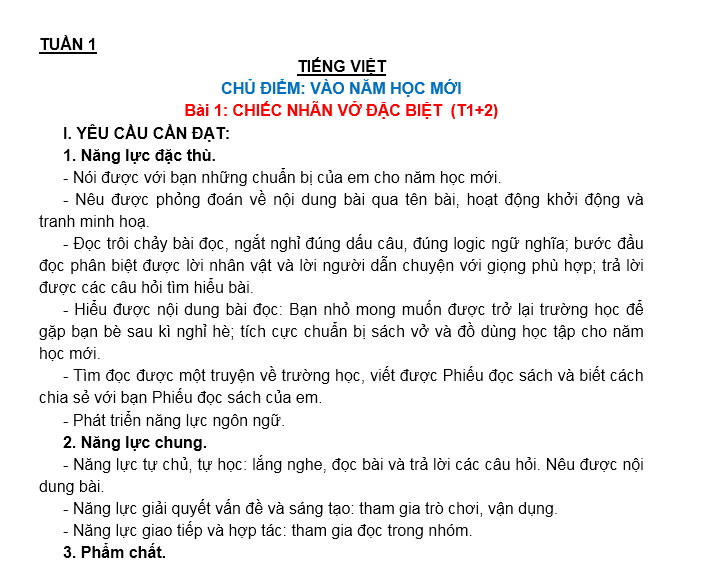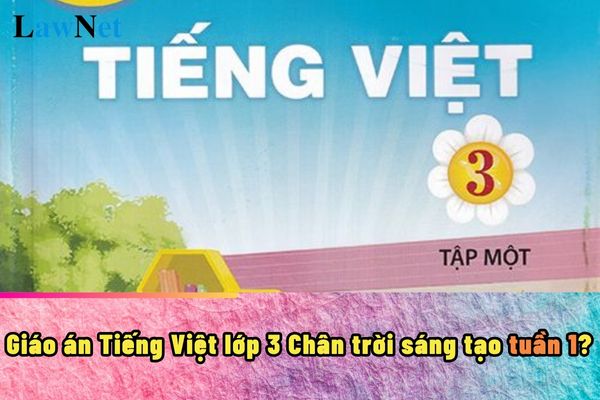Guidelines on the lesson plan for week 1 of grade 3 Vietnamese Language subject according to the Chân trời sáng tạo curriculum
Guidelines on the lesson plan for week 1 of grade 3 Vietnamese Language subject according to the Chân trời sáng tạo curriculum
The new school year has begun, so preparing a Vietnamese Language lesson plan for Grade 3 under the "Chân trời sáng tạo" curriculum for the first week of the new academic year is extremely important, not only for teachers but also for students.
Dear teachers, you may refer to the sample Vietnamese Language lesson plan for Grade 3 "Chân trời sáng tạo" Week 1 below:

Download the latest Vietnamese Language Grade 3 "Chân trời sáng tạo" Week 1 Lesson Plan 2024.
**Note: Information is for reference only./.

Guidelines on the lesson plan for week 1 of grade 3 Vietnamese Language subject according to the Chân trời sáng tạo curriculum (Image from the Internet)
What are contents that students in Vietnam will learn in the Vietnamese Language Grade 3 curriculum?
Based on Subsection 2, Section V of the Vietnamese Language Curriculum issued together with Circular 32/2018/TT-BGDDT, the contents that students will learn in the Vietnamese Language Grade 3 curriculum include:
* Vietnamese Knowledge
- How to write the title of a text
- Themed vocabulary
- Synonyms and antonyms
- Words indicating objects, activities, qualities- Basics of declarative, interrogative, imperative, exclamatory sentences: characteristics shown through punctuation marks, words marking sentence types, and the function of each sentence type
- Functions of dashes (placed at the beginning of lines to mark direct speech of characters); quotation marks (marking direct quotations or dialogue); colons (signaling explanations, enumerations)
- Metaphorical comparison methods: characteristics and effects
- Basics of paragraphs and multi-paragraph texts: identification signs
- Basics of conversational turns through group exchanges
- Text types and genres
+ Paragraphs retelling a story read or an event done
+ Descriptive paragraphs about objects
+ Paragraphs sharing feelings, emotions
+ Paragraphs explaining why one likes a character in a story
+ Paragraphs introducing objects, narrating a phenomenon comprising 2-3 events, short announcements or news briefs, pre-printed forms
- Information via images, data (nonverbal communication means)
* Literary Knowledge
- Lessons derived from texts
- Location and time
- Characters' thoughts and actions
* Materials
(1) Literary Texts
- Fairy tales, fables, short stories; descriptive essays
- Poems, folk rhymes, proverbs, chants
Text length: stories around 200-250 words, descriptive essays around 180-200 words, poems around 80-100 words
(2) Informational Texts
- Texts introducing an object, narrating a phenomenon comprising 2-3 events
- Short announcements, pre-printed forms
Text length: around 120-150 words.
What are special competencies required after completing the grade 3 Vietnamese Language curriculum?
Based on Section IV of the Vietnamese Language Curriculum issued together with Circular 32/2018/TT-BGDDT, the special competencies required after completing the grade 3 Vietnamese Language curriculum include:
[1] Required Language Competencies:
- Read accurately, fluently, and expressively; understand the main content of a text, primarily explicit content; initially understand implicit content such as themes, lessons derived from the read texts.
- At the primary level, reading requirements include reading technique and reading comprehension skills. For early grades (Grade 1, Grade 2) students, emphasis is on reading accurately at a suitable speed and understanding simple text content.
For students in Grade 3, Grade 4, and Grade 5, emphasis is on comprehending specific content, understanding the theme, and deriving lessons from the text.
- From Grade 1 to Grade 3, write accurately in spelling, vocabulary, grammar; write some sentences and short paragraphs; in Grade 4 and Grade 5, initially write complete short essays, mainly narrative, descriptive, and simple introductions.
- Write texts retelling stories read, witnessed events, self-imagined stories; describe familiar objects, phenomena; introduce familiar objects and activities in students' lives.
- Write paragraphs expressing students' feelings, thoughts after reading a story, poem, witnessing an emotional event; give opinions on a simple issue in studies and life; write some text types such as: autobiographies, messages, invitations, schedules, letters, etc.; initially know how to write following a process; the text should include three parts (introduction, body, conclusion).
- Present ideas and feelings in an understandable manner; initially know how to use appropriate gestures and manners when speaking; retell a read or heard story clearly; know how to share and exchange feelings, attitudes, thoughts on discussed issues; know how to explain an object or a simple process.
- Listen and understand with appropriate attitude and grasp the main content; recognize the speaker's emotions; know how to respond to what has been heard.
[2] Required Literary Competencies:
- Differentiate between narrative and poetic texts (prose, poem segments); recognize text content and the author's attitude, feelings; initially understand the effects of some literary elements (words, characters, plot, rhyme, comparisons, personifications). Know how to associate, imagine, and express literary qualities in writing and speaking.
- For students in Grade 1 and Grade 2, they must recognize texts about someone or something; recognize characters in stories, rhymes in poems; differentiate between stories and poems.
- For students in Grade 3, Grade 4, and Grade 5, they must know how to read literary texts expressively; retell, summarize the main content of the story, poem; comment on characters, events, the author's attitude, feelings in the text; recognize time and place, some poem rhymes, rhythms, beautiful and unique words, images, and the effects of rhetorical devices like personification and comparison.
- Understand the meaning or lesson derived from the text. Write segments, stories, descriptive essays showing emotions and ability to associate, imagine.

